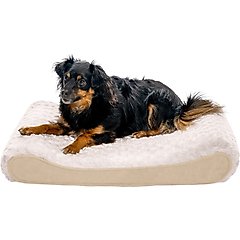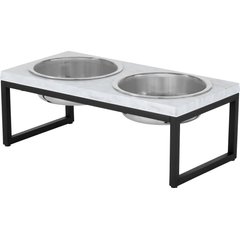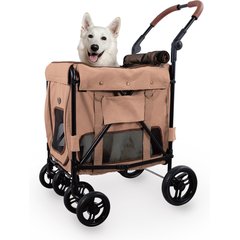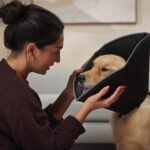What Is Cancer in Dogs? And What Are the Signs?
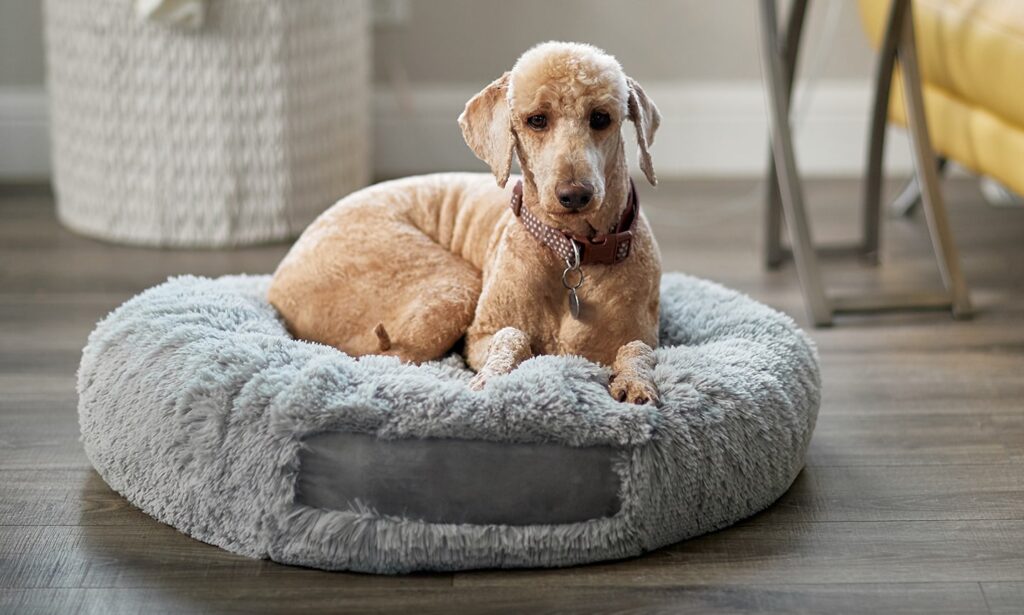
Photo by Productimagepro/iStock/Getty Images Plus
Cancer in dogs is one of the most common health concerns pet parents face, especially as their canine companions get older. Like humans, several types of cancer can affect dogs; and while some are more aggressive than others, all require veterinary care.
Learn the ins and outs of cancer in dogs, including what it is, symptoms, common types, and what to do if you suspect your dog may be affected.
What Is Cancer in Dogs? What Are the Most Common Types?
Cancer in dogs refers to a broad group of diseases that share a common feature: the uncontrolled growth and spread of abnormal cells.
In a healthy dog’s body, genes regulate cell growth, signaling when to start and stop dividing. However, cancerous cells ignore these instructions—and multiply unchecked. How fast cancer grows and where it spreads depends on the type of cancer.
Cancer is the leading cause of death in dogs, accounting for 27% of all deaths and more than 30% of deaths in dogs over one year of age. In fact, nearly 50% of dogs over the age of 10 will develop cancer, according to the American Veterinary Medical Association (AVMA).
What Are the Most Common Cancers in Dogs?
Like humans, several different types of cancer affect dogs. Some of the most common types include:
- Lymphoma in dogs
- Skin cancer in dogs (mast cell tumors are the most common type)
- Bone cancer in dogs (osteosarcoma is the most common type)
- Mouth cancer in dogs
- Bladder cancer in dogs (transitional cell carcinoma is the most common type)
- Lung cancer in dogs
- Nasal cancer in dogs
- Spleen cancer in dogs
- Breast cancer in dogs (aka mammary cancer in dogs)
- Liver cancer in dogs
- Eye cancer in dogs
- Prostate cancer in dogs
- Anal gland cancer in dogs
- Stomach cancer in dogs
- Thyroid cancer in dogs
- Kidney cancer in dogs
Are Certain Dog Breeds More Susceptible to Cancer Than Others?
“There are certain dog breeds that are predisposed to getting cancer,” says Brolin Evans, DVM, DACVIM-O, owner and board-certified veterinary oncologist at Arista Advanced Pet Care in Sandy Springs, Georgia. “Oftentimes, we create genetic bottlenecks when breeding dogs that unknowingly concentrate cancer genes in that breed.”
Some breeds with the highest risk of cancer include:
“Additionally, some breeds have increased risks for the development of certain types of cancer,” Dr. Evans says. “For instance, Scottish Terriers are nearly 20-times more likely to develop bladder cancer than other breeds, and up to 25% of Bernese Mountain Dogs will develop an aggressive form of cancer called histiocytic sarcoma.”
Cancer doesn’t just affect purebred dogs—mixed-breed dogs are susceptible, too, adds Dr. Evans.
What Are the Signs of Cancer in Dogs?
Dogs with cancer can have a range of symptoms, some more obvious than others. Here are warning signs to watch out for:
- Lumps or bumps of any size
- Swelling
- A wound that isn’t healing
- Abnormal discharges, such as blood or pus
- Abnormal odors
- Swollen lymph nodes
- Stomach bloating
- Behavioral changes, seizures, or head tilt
- Coughing or labored breathing
- Loss of appetite and weight loss
- Reduced energy or exercise intolerance
- Pale gums
- Lethargy
- Vomiting or diarrhea
- Signs of pain, such as limping, whimpering, reluctance to move, or changes in posture
What Causes Cancer in Dogs?
At its core, cancer is a disease of uncontrolled cell growth.
Cells have built-in checkpoints that regulate their growth, activity, and lifespan, explains Dr. Evans. When a cell mutation occurs at one of these checkpoints, a cell may multiply uncontrollably. While most mutated cells self-destruct, those that evade the body’s defenses can lead to cancer.
So, what causes the cell mutations that cause cancer? In most cases, cancer develops due to a combination of factors rather than a single cause. According to Dr. Evans, the primary contributors include:
- Age: As dogs age, their cells accumulate damage and undergo more divisions, increasing the risk of spontaneous cancer-causing mutations. Additionally, aging weakens DNA repair and immune function, making it harder for the body to detect and eliminate abnormal cells.
- Genetics: Some dogs inherit genetic mutations that make them more cancer-prone. While genes alone don’t guarantee cancer, they can increase the risk.
- Toxin exposure: Chemical and toxin exposure can damage DNA, increasing cancer risk. For example, herbicides and pesticides are linked to bladder, blood, and testicular cancer, while tobacco smoke has been shown to increase the risk of bladder and nasal cancer in certain breeds.
- UV exposure: UV exposure can lead to skin cancer, particularly in dogs with light-colored or thin coats.
- Size: Larger breeds have a higher cancer risk. Their rapid growth, faster aging, and greater number of cells increase cell turnover, creating more opportunities for mutations to develop.
When Should I Take My Dog to the Vet?
If your dog has any of the symptoms listed above, take your pup to the vet as soon as possible. Even minor symptoms or changes in behavior warrant a visit, as early detection can lead to better treatment outcomes.
During your visit, the vet will perform a physical exam to assess any concerning signs. Depending on the findings, your vet may recommend tests like blood work, X-rays, ultrasounds, or a biopsy.
Treatment options vary based on the type and stage of cancer and may include surgery, chemotherapy, radiation, or palliative care.
“Unfortunately, we do not often find a lot of internal cancers until they are later stage. Therefore, we are not often able to cure dogs with cancer,” Dr. Evans says. “However, we are generally able to provide a good to excellent quality of life for a time.”
How Can I Help My Dog Feel More Comfortable?
There are different accommodations based on the type of cancer a dog has, says Elizabeth Benson, DVM, founder of Paws into Grace, a Southern California-based company that specializes in end-of-life pet care.
The following adjustments at home can make a big difference in your dog’s comfort and well-being:
- Soft, supportive bedding: Provide a thick, orthopedic bed, such as the FurHaven Plush Luxe Lounger, to relieve pressure on joints and prevent bed sores, especially if your dog is resting more than usual.
- Ramps and non-slip flooring: If mobility is an issue, Dr. Benson says ramps, like the PetSafe CozyUp Ramp, can help with stairs or getting onto furniture, while rugs or non-slip mats prevent slipping.
- Easier access to essentials: Keep food, water, and favorite resting spots easily accessible to reduce strain. Elevated bowls, such as the Frisco Marble Double Elevated Dog Bowl, may help dogs with difficulty bending down.
- Temperature control: Dogs with cancer may be more sensitive to temperature changes. Keep them warm in cooler weather and provide a cool resting spot in the heat.
- Pain management: Dr. Benson emphasizes the importance of working with your veterinarian to manage your dog’s pain, as they tend to hide discomfort even when experiencing significant pain.
- Minimize stress: To keep stress low, stick to a familiar routine, keep noise levels low, and provide a quiet space for your pup to rest.
- Adapted activities: Support your dog’s emotional well-being by adapting activities they love. “For example, if your pet has trouble walking on their favorite daily walk, try taking them for a lap in a pet wagon instead,” Dr. Benson says.
Recommended Products
What Can I Do To Help Prevent Cancer in My Dog?
Many cancers can’t be prevented, so don’t blame yourself if your dog develops this disease. That said, there are a few steps you can take to potentially reduce your dog’s risk:
- Help them maintain a healthy weight. Obesity is considered a risk factor for cancer, so regular exercise, a healthy diet, and portion control can help keep your dog at a healthy weight.
- Limit toxin exposure. Do your best to avoid known carcinogens, such as pesticides, herbicides, secondhand smoke, and excessive sun exposure.
- Spay or neuter at the right time. This can reduce the risk of reproductive cancers, but timing matters—talk to your vet about the best approach based on breed and health.
- Do breed research. Unfortunately, some breeds are more susceptible to cancer than others. Dr. Benson says mutts (commonly found at shelters) generally have lower risks of cancers. If you choose to buy a dog, ask the breeder about cancer incidence in their lines. “A responsible breeder should keep track of this and be able to provide this information,” Dr. Evans says.
FAQs About Cancer in Dogs
What are the first signs of cancer in dogs?
The early signs of cancer can vary, but often include lumps or bumps, sudden weight loss, loss of appetite, lethargy, non-healing wounds, coughing, changes in bathroom habits, difficulty breathing, and signs of pain. Any unexplained changes in your dog’s behavior or health should be checked by a veterinarian.
What’s the most common cancer in dogs?
Lymphoma is the most common cancer in dogs. It affects the lymphatic system and can occur in various parts of the body, including the lymph nodes, spleen, and bone marrow.
